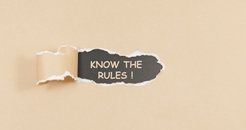 Hidden rules among classes
Hidden rules among classes
From 'A Framework for Understanding Poverty' Dr Ruby Payne
Ruby K. Payne, Ph.D., is an American educator and author best known for her book A Framework for Understanding Poverty which has sold over 1.8M copies and also her work on the culture of poverty and its relation to education.
Hidden rules are the unspoken cues and habits of a group. If you are in a group, you understand the hidden rules of that group and the danger is you take these for granted that they are for everyone.
Dr Payne explains:
The following table from her book illustrates some of the hidden rules of groups defined by the resources they have. These can be; financial, emotional, mental ability, spiritual, physical, relationships and support systems. (Dr Payne relates this to class although we might be uncomfortable with that attribution).
|
POOR |
MIDDLE CLASS (COMFORTABLE) |
WEALTHY |
POSSESSIONS
|
People. |
Things. |
One-of-a-kind objects, legacies, pedigrees. |
MONEY
|
To be used, spent. |
To be managed. |
To be conserved invested. |
PERSONALITY
|
Is for entertainment. Sense of humor is highly valued. |
Is for acquisition and stability.
Achievement is highly valued. |
Is for connections. Financial, political, social connections are highly valued. |
SOCIAL EMPHASIS
|
Social inclusion of people they like. |
Emphasis is on self-governance and self-sufficiency |
Emphasis is on social exclusion. |
FOOD
|
Key question: Did you have enough? Quantity important. |
Key question: Did you like it? Quality important. |
Key question: Was it presented well? Presentation important. |
CLOTHING
|
Clothing valued for individual style and expression of personality. |
Clothing valued for its quality and acceptance into norm of middle class. Label important |
Clothing valued for its artistic sense and expression. Designer important |
TIME
|
Present most important. Decisions made for moment based on feelings or survival. |
Future most important. Decisions made against future ramifications. |
Traditions and history most important. Decisions made partially on basis of tradition and decorum. |
EDUCATION
|
Valued and revered as abstract but not as reality. |
Crucial for climbing success ladder and making money. |
Necessary tradition for making and maintaining connections. |
DESTINY
|
Believes in fate. Cannot do much to mitigate chance. |
Believes in choice. Can change future with good choices now. |
Noblesse oblige. |
LANGUAGE
|
Casual register. Language is about survival. |
Formal register. Language is about negotiation. |
Formal register. Language is about networking. |
FAMILY STRUCTURE
|
Tends to be matriarchal. |
Tends to be patriarchal. |
Depends on who has money. |
WORLD VIEW
|
Sees world in terms of local setting. |
Sees world in terms of national setting. |
Sees world in terms of international view. |
LOVE
|
Love and acceptance conditional, based upon whether individual is liked. |
Love and acceptance conditional and based largely upon achievement. |
Love and acceptance conditional and related to social standing and connections. |
DRIVING FORCE
|
Survival, relationships, entertainment. |
Work, achievement. |
Financial, political, social connections. |
Looking at the last row for example, it illustrates that the driving forces of the poor are survival, entertainment and relationships whereas for the middle class, the criteria against which most decisions are made relate to work and achievement. For the wealthy, decisions are considered based on the effect on finance, political and social connections.
Using money for security is grounded in the middle class and wealthy. Those in poverty see money as an expression of personality and it is used for entertainment and relationships.
Words are used to resolve conflict by negotiation in the middle class and wealthy but what if you don't have the necessary words or even respect them if you are in poverty? Violence is often the way to resolve issues.
You can see the problems here for a church wanting to help the poor. Hidden rules govern so much of our immediate assessment of an individual and his/her capabilities.
There is a danger that a church which is mostly 'middle-class' will assume their hidden rules apply to the poor. They will create plans and strategies based on their rules and will only really accept people into their group that understand and conform to the hidden rules. If you really want the church to be for all, then something has to change...
The key is to understand the rules of other groups so that they can be used if one chooses. To help do this, why not have people from different groups speak into your plans and strategies?
See also a blog on this site based on later research - Church of the poor - the barrier of middle class church.
Retweet about this article:
From A Framework for Understanding Poverty Dr Ruby, 17/10/2016